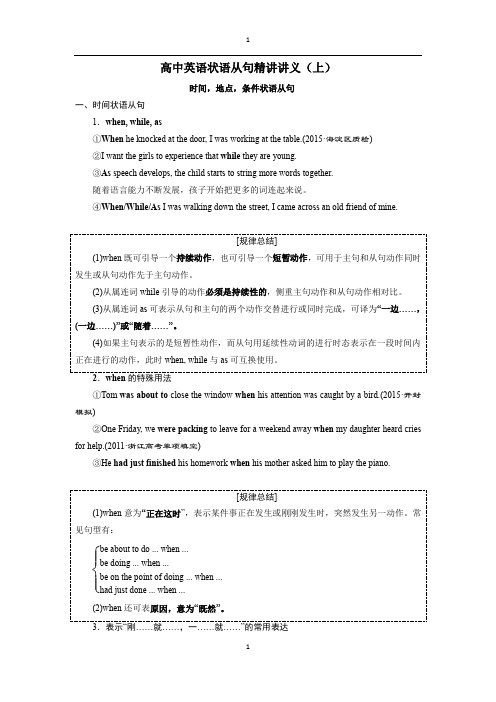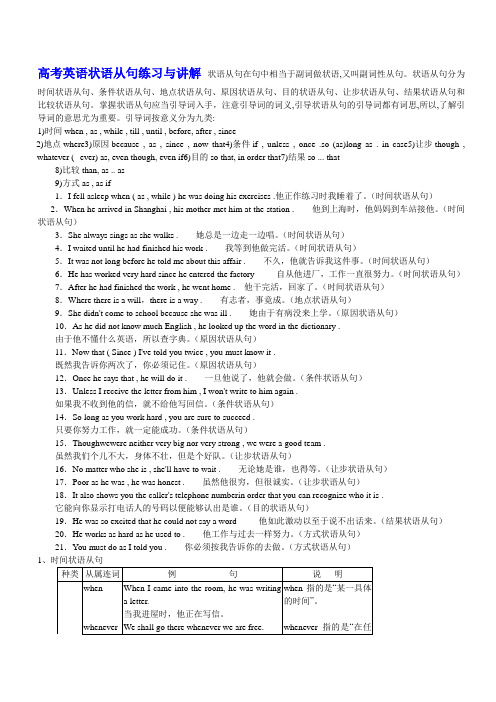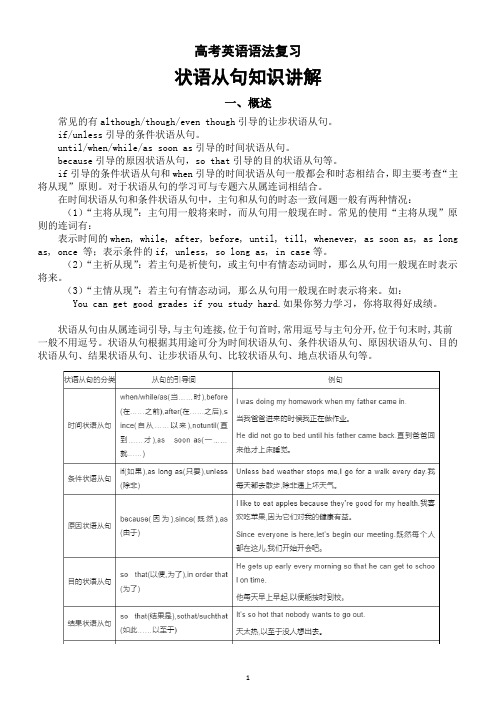高中英语语法状语从句讲义
- 格式:docx
- 大小:194.38 KB
- 文档页数:13

高中英语状语从句精讲讲义(上)时间,地点,条件状语从句一、时间状语从句1.when, while, as①When he knocked at the door, I was working at the table.(2015·海淀区质检)②I want the girls to experience that while they are young.③As speech develops, the child starts to string more words together.随着语言能力不断发展,孩子开始把更多的词连起来说。
④When/While/As I was walking down the street, I came across an old friend of mine.[规律总结](1)when 既可引导一个持续动作,也可引导一个短暂动作,可用于主句和从句动作同时发生或从句动作先于主句动作。
(2)从属连词while 引导的动作必须是持续性的,侧重主句动作和从句动作相对比。
(3)从属连词as 可表示从句和主句的两个动作交替进行或同时完成,可译为“一边……,(一边……)”或“随着……”。
(4)如果主句表示的是短暂性动作,而从句用延续性动词的进行时态表示在一段时间内正在进行的动作,此时when, while 与as 可互换使用。
2.when 的特殊用法①Tom was about to close the window when his attention was caught by a bird.(2015·开封模拟)②One Friday, we were packing to leave for a weekend away when my daughter heard cries for help.(2011·浙江高考单项填空)③He had just finished his homework when his mother asked him to play the piano.[规律总结](1)when 意为“正在这时”,表示某件事正在发生或刚刚发生时,突然发生另一动作。

状语从句状语从句在高考试题中由于其他从句的干扰,以及倒装句,强调句的介入,使得状语从句更为复杂。
状语从句是一种副词性从句,通常由一个从属连词或一个起连词作用的词组引导。
状语从句1. 时间状语从句常见的连词(组):when, while, as, before, after, once, till, until, as soon as, now that, hardly ...when, scarcely ...when, no sooner ...than等。
可以引导时间状语从句的副(介)词(短语)或名词短语:directly, instantly, immediately, by the time, the moment, the second, the minute, the instant, every time, each time, next time, the last time等。
注意点如下:(1) when, while, as引导的时间状语从句as表示“当……的时候”,往往和when/ while通用,但它着重强调主句与从句的动作或事情同时或几乎同时发生。
when(at or during the time)既可以表示在某一点的时候,又可以表示在某一段时间内,主句与从句的动作或事情可以同时发生也可以先后发生。
while强调一段时间,仅表示从句和主句的动作同时发生,并且有延续意义,该从句中的动词一般要用延续性动词,从句中常用过去进行时态或一般过去时态;当when表示a period of time时,两者可以互换。
She came up as I was cooking.(同时) 在我做饭时,她走了过来。
When we were at school, we went to the library every day.(在一段时间内) 当我们在学校时,每天都去图书馆。
While they were watching TV, I was preparing myself for the coming examination.他们在看电视,而我在为即将到来的考试做准备。



高考英语状语从句练习与讲解状语从句在句中相当于副词做状语,又叫副词性从句。
状语从句分为时间状语从句、条件状语从句、地点状语从句、原因状语从句、目的状语从句、让步状语从句、结果状语从句和比较状语从句。
掌握状语从句应当引导词入手,注意引导词的词义,引导状语从句的引导词都有词思,所以,了解引导词的意思尤为重要。
引导词按意义分为九类:1)时间when , as , while , till , until , before, after , since2)地点where3)原因because , as , since , now that4)条件if , unless , once .so (as)long as . in case5)让步though , whatever (--ever) as, even though, even if6)目的so that, in order that7)结果so ... that8)比较than, as .. as9)方式as , as if1.I fell asleep when ( as , while ) he was doing his exercises .他正作练习时我睡着了。
(时间状语从句)2.When he arrived in Shanghai , his mother met him at the station .他到上海时,他妈妈到车站接他。
(时间状语从句)3.She always sings as she walks .她总是一边走一边唱。
(时间状语从句)4.I waited until he had finished his work .我等到他做完活。
(时间状语从句)5.It was not long before he told me about this affair .不久,他就告诉我这件事。
(时间状语从句)6.He has worked very hard since he entered the factory 自从他进厂,工作一直很努力。


2023年高中语法条件状语从句用法说明讲义1. 引导让步状语从句的连词:“though,although,even though,even if ”等连词常被用来引导让步状语从句。
这些词引导让步状语从句时,主句不可用but,但可以用yet或still.例句:Although he tried hard, (yet/still) he failed.尽管他很努力了,但仍然失败了。
Though he was inexperienced, he did a very good job.尽管没有经验,但他表现得很不错。
(1)His first lecture was delivered on Nov.4, 1915, and it explained his new approach, though he admitted he did not yet have the precise mathematical formulation of it本句考查的是由though引导的让步状语从句。
句子前半句为肯定句,后半句为否定句,是典型的转折关系。
【参考译文】他的第一场讲座安排在1915年11月4日,爱因斯坦解释了他的新方法,虽然他也坦承自己尚未找到精确的数学公式。
(2)Although simple versions of miniature devices have hadan impact, advanced versions are still several years away. 本句考查although引导的让步状语从句。
句子前半句为否定句,后半句为肯定句,是典型的转折关系。
【参考译文】尽管简单版的微型装置已经起到了一定的作用,但更高级的微型装置的问世仍需要几年时间。
2. 表示让步转折关系的介词这些介词主要有despite,in spite of,for all和notwithstanding。

2024年高中英语语法学习之状语从句精讲英语状语从句是英语学习中的一个重要考点,下面将针对英语状语从句进行考点归纳。
一、时间状语从句时间状语从句是语法中的一个重要考点,下面是一些常见的时间状语从句: when:表示某个时间点或时间段,如“I will arrive at the airport when the plane takes off.”before:表示某个时间点或时间段之前,如“I will eat breakfast before I go to work.”after:表示某个时间点或时间段之后,如“I will finish my homework after I have dinner.”while:表示某个时间点或时间段持续,如“I was studying while she was sleeping.”as soon as:表示某个时间点或时间段一过去就发生,如“I will call you as soon as I get home.”until:表示某个时间点或时间段一直持续,如“I won't leave until I have finished my work.”since:表示某个时间点或时间段以来,如“I have been living in this city since I moved here last year.”when/while/as:这些词都可以引导时间状语从句,但它们的使用略有不同,需要根据具体语境选择使用哪个。
需要注意的是,如果主句是一般将来时,从句只能用一般现在时,如“I will go to the store tomorrow”中的“tomorrow”就是时间状语从句。
二、地点状语从句地点状语从句是语法中的一个重要考点,下面是一些常见的地点状语从句: where:表示某个地点,如“I will go to the store where I bought the groceries.”that:表示某个地点或位置,如“I saw a beautiful sunset over that mountain.”which:表示某个地点或位置,如“The building which is on fire needs to be evacuated immediately.”where/that/which:这些词都可以引导地点状语从句,但它们的使用略有不同,需要根据具体语境选择使用哪个。

状语从句●定义:用“引导词+述语序”作状语●状语:修饰动作,把句子“壮大”He speaks English well.(方式状语)The sun rises in the east and sets in the west.(地点状语)●九种状语从句:时间、地点、原因、结果、方式、目的、条件、让步、比较I love you you love me(1)when—时间状语(2)where—地点状语(3)because—原因状语(4)so—结果状语(5)as—方式状语(6)in order that—目的状语(7) I will love you if you love me.—条件状语(8) I won’t love you even if you love me.—让步状语(9)more than—比较状语意思不同,形式不同,形意相关I read English loudly in the open air every morning.方式状语地点状语时间状语用从句形式当状语,即状语从句(一)时间状语从句引导词●till, untilA until B:A一直延续到B出现或发生就停止I slept until noon.I didn’t go to bed until midnight.I entered the room until 6:30.I didn’t enter the room until 6:30.as soon as,the minute, the moment, the instant, immediately, directlyno sooner…than, hardly…when, scarcely…when(结合倒装句)●before, after, 完成+since(自从)+过去时间--what was the party like?--Wonderful. It’s years I enjoyed myself so much.A. afterB. beforeC. whenD. sinceIt is 50 years the PRC was founded.A. afterB. beforeC. whenD. sinceI knew Mr. Green I knew Mrs. Green.A. long beforeB. before long过不了多久C. long agoD. after long●when, while, as(当)(1)while持续性动作或状态D on’t laugh while you are praying.(2)as伴随或较短的时间As I was speaking, some of you were sleeping.Mother was worried because little Alice was ill, especially father was away in France.A. asB. thatC. during介词,后面只能跟名词D. if(3)when当…时/正在这时,突然…/正要做某事,突然…When I was young, I listened to the radio.I was doing my homework when the earthquake happened.I was about to do my homework…Why do you want a new job you got such a good one already?A. thatB. whereC. whichD. whenhis plane arrived at the airport in Paris, I had already left for Los Angeles.A. WhileB. UntilC. WhenD. AsIt just isn’t fair. I was working as a waiter last month, my friends were lying on the beach.A. WheneverB. thoughC. forD. while延续的感觉(二)其他状语从句●whereAfter the war, a new school building was put up there had once been a theatre.A. thatB. whereC. whichD. when●because, since, asIt was he was ill that he didn’t go with us.A. since既然B. for为推断找解释C. as由于D. because直接原因或根本原因It must have rained last night, the ground is wet this morning.A. forB. sinceC. becauseD. asThe ground is wet, because it rained last night.He must be ill, he looks so pale.A. sinceB. becauseC. asD. for_____ you are free tonight, why not drop in and play chess with me?A. ForB. Since既然C. BecauseD. Even if●so…that…/ such…that如此…以致于Father was busy in working he often forget rest or meals.A. very, thatB. so, thatC. such, asD. enough, as●as(以…方式),as if/ as thoughShe doesn’t speak her friend, but her written work is excellent.A. as well asB. so often asC. so much asD. as good as●unless=if +notYou will be late you leave immediately.A. unlessB. untilC. ifD. or●though, although, even if, even thoughwhile(虽然,而)whatever, whoever, wherever, whenever, however, whicheveras(尽管)thanAlthough he is a man, he likes skirts. = Man as he is, …Try he might, he couldn’t get out of difficulty.A. whenB. whereC. tillD. as, he can never solve the problem alone.A. Clever and intelligent he isB. Clever and intelligent as he isC. As he is clever and intelligentD. As clever and intelligent he is, mother will wait for him to have dinner together.A. However late is heB. However he is lateC. However is he lateD. However late he is●now that(既然), in that(因为)●so that, in order that●lest, in case, for fear that(以防)if, as/ so long as, onceThe volleyball match will be put off if it .A. will rainB. rainsC. rainedD. is rainingThe new secretary is supposed to report to the manager as soon as she .A. will arriveB. arrivesC. is arrivingD. is going to arriveRemember to send me a photo of your son next time you to me.A. writeB. will writeC. are writingD. would write。

状语从句句子的类型句子:简单句并列句复合句:●名词性从句:主语从句、宾语从句、表语从句、同位语从句●状语从句●定语从句什么是状语状语时用来修饰词,词,词或的一种句子成分。
它可以表示时间、地点、原因、目的、结果、条件、让步、比较、方式等。
当充当状语的部分是一个句子时,也就是状语从句,来说明一件事情发生的时间,地点,原因,条件,结果等。
分类如下:状语从句1. 时间状语从句2. 地点状语从句3. 原因状语从句4. 条件状语从句5. 让步状语从句6. 目的状语从句7. 结果状语从句8. 方式状语从句9. 比较状语从句1. While I was wondering at this, our schoolmaster took his place. ( )2. Where there is a will, there is a way. ( )3. Now that/Since everybody is here, let’s begin our meeting. ()4. I’ll speak slowly so that you can understand me. ( )5. So clever was he a student that he was able to work out all the difficult problems. ( )6. As long as you don’t lose heart, you’ll succeed. ()7. He is unhappy, though he has a lot of money.8. The old lady treats the boy as if he were his own son. ( )一.时间状语从句(一)用when, while或as 填空:1._____________ we were talking, Mr Smiths came in.2._____ they came home, I was cooking dinner.3.I was about to go to bed _______ I heard someone knock at t the door.(并列句)4. ________ we were watching TV, he was studying.5. He is fat _______ his brother is thin. (并列句)6. _____she sang, tears ran down her face.A 从句为‖当……的时候‖,从句谓语为延续性动词,主句谓语为非延续性动词(即终止性动词), 三者可通用.B 当从句的谓语动词为终止性动词,只能用when; 表示―正在那时‖, 也只能用when.C.从句和主句的谓语动词都为延续性动词时, 只能用while; while还可作并列连词,表示‖而‖.D. 当强调主句和从句的动作同时发生时,只能用as, 译为“正当…;一边…一边…; 随着…”________he talked on, he got more and more excited.________ you grow older ,you will know better and better about yourself.They talked ______they walked along the river.(二)“一…就”除用as soon as 外,还可用the moment、immediately、no sooner…than, hardly…when 等。

高考英语语法复习状语从句知识讲解一、概述常见的有although/though/even though引导的让步状语从句。
if/unless引导的条件状语从句。
until/when/while/as soon as引导的时间状语从句。
because引导的原因状语从句,so that引导的目的状语从句等。
if引导的条件状语从句和when引导的时间状语从句一般都会和时态相结合,即主要考查“主将从现”原则。
对于状语从句的学习可与专题六从属连词相结合。
在时间状语从句和条件状语从句中,主句和从句的时态一致问题一般有两种情况:(1)“主将从现”:主句用一般将来时,而从句用一般现在时。
常见的使用“主将从现”原则的连词有:表示时间的when, while, after, before, until, till, whenever, as soon as, as long as, once 等;表示条件的if, unless, so long as, in case等。
(2)“主祈从现”:若主句是祈使句,或主句中有情态动词时,那么从句用一般现在时表示将来。
(3)“主情从现”:若主句有情态动词, 那么从句用一般现在时表示将来。
如:You can get good grades if you study hard.如果你努力学习,你将取得好成绩。
状语从句由从属连词引导,与主句连接,位于句首时,常用逗号与主句分开,位于句末时,其前一般不用逗号。
状语从句根据其用途可分为时间状语从句、条件状语从句、原因状语从句、目的状语从句、结果状语从句、让步状语从句、比较状语从句、地点状语从句等。
二、时间状语从句(1)当主句是一般将来时态或祈使句,表示将来的意义时,从句通常用一般现在时,简称“主将从现”。
I’ll ring you up as soon as I get to Beijing.我一到北京就给你打电话。
(2) when引导的时间状语从句,通常表示主句和从句的动作同时发生;before表示主句的动作发生在从句的动作之前;after则表示主句的动作发生在从句的动作之后;as引导时间状语从句时,往往表示主句和从句的动作同时发生,不分先后。
Grammar —Adverbial Clause状语从句定义:用“引导词 +陈述语序”作状语状语:修饰动作,把句子“壮大”He speaks English well .(方式状语)The sun rises i n the east and sets in the west .(地点状语)九种状语从句:时间、地点、原因、结果、方式、目的、条件、让步、比较Ilove you you love me(1)when —时间状语(2)where —地点状语(3)because —原因状语(4)so —结果状语(5)as —方式状语(6)inorderthat —目的状语(7) I will love you if you love me. —条件状语(8) I won ’ t love you even if you love me. —让步状语(9)more than —比较状语意思不同,形式不同,形意相关I read English loudlyin the open airevery morning.1Grammar —Adverbial Clause方式状语地点状语时间状语用从句形式当状语,即状语从句(一)时间状语从句引导词till, untilA untilB : A 一直延续到 B 出现或发生就停止I sleptuntilnoon.I didn ’ t go to bed until midnight.I entered the room until 6:30.I didn ’ t enter the room until 6:30.as soon as,the minute, the moment, the instant, immediately, directlyno sooner ⋯ than, hardly ⋯ when, scarcely ⋯ when(结合倒装句 ) before, after, 完成 +since( 自从 )+过去时间--what was the party like?--Wonderful. It ’ s yearsI enjoyed myself so much.A. afterB. beforeC. whenD. since2Grammar —Adverbial ClauseIt is 50 years the PRC was founded.A. afterB. beforeC. whenD. sinceIknew Mr. Green I knew Mrs. Green.A. long beforeB. before long 过不了多久C. long agoD. after longwhen, while, as (当)(1)while 持续性动作或状态Don’ t laugh while you are praying.(2)as 伴随或较短的时间内As Iwas speaking, some of you were sleeping.Mother was worried because little Alice was ill, especially father was away in France.A. asB. thatC. during 介词,后面只能跟名词D. if(3)when 当⋯时 /正在这时,突然⋯ /正要做某事,突然⋯When I was young, I listened to the radio.Iwas doing my homework when the earthquake happened.Iwas about to do my homework ⋯Why do you want a new job you got such a good one already?A. thatB. whereC. whichD. whenhis plane arrived at the airport in Paris, I had already left for Los Angeles.3Grammar —Adverbial ClauseA. WhileB. UntilC. WhenD. AsIt just isn ’ t fair. I was working as a waiter last month, my friends were lying on the beach.A. WheneverB. thoughC. forD. while 延续的感觉(二)其他状语从句whereAfter the war, a new school building was put up there had once been a theatre. A. that B. whereC. whichD. whenbecause, since, asIt was he was ill that he didn ’ t go with us.A. since 既然B. for 为推断找解释C. as 由于D. because 直接原因或根本原因It must have rained last night, the ground is wet this morning.A. forB. sinceC. becauseD. asThe ground is wet, because it rained last night.He must be ill, he looks so pale.A. sinceB. becauseC. asD. for_____ you are free tonight, why not drop in and play chess with me?A. ForB. Since 既然C. BecauseD. Even if4Grammar —Adverbial Clauseso⋯ that ⋯ / such ⋯ that如此⋯以致于Father was busy in working h e often forget rest or meals.A. very, thatB. so, thatC. such, asD. enough, asas( 以⋯方式 ), as if/ as thoughShe doesn ’ t speak her friend, but her written work is excellent.A. as well asB. so often asC. so much asD. as good asunless=if +notYou will be late you leave immediately.A. unlessB. untilC. ifD. orthough, although, even if, even thoughwhile( 虽然,而 )whatever, whoever, wherever, whenever, however, whicheveras( 尽管 )thanAlthough he is a man, he likes skirts. = Man as he is,⋯Try he might, he couldn ’t get out of difficulty.A. whenB. whereC. tillD. as5Grammar —Adverbial Clause, he can never solve the problem alone.A. Clever and intelligent he isB. Clever and intelligent as he isC. As he is clever and intelligentD. As clever and intelligent he is, mother will wait for him to have dinner together.A. However late is heB. However he is lateC. However is he lateD. However late he isnow that (既然) , in that (因为)so that, in order thatlest, in case, for fear that( 以防 )if, as/ so long as, onceThe volleyball match will be put off if it .A. will rainB. rainsC. rainedD. is rainingThe new secretary is supposed to report to the manager as soon as she .A. will arriveB. arrivesC. is arrivingD. is going to arriveRemember to send me a photo of your son next time you to me.6Grammar —Adverbial ClauseA. writeB. will writeC. are writingD. would write7。